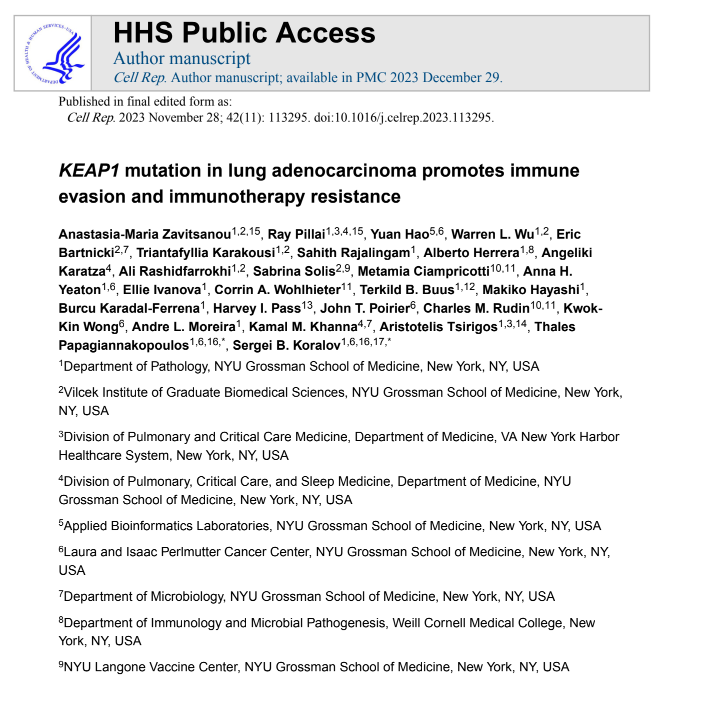Cancer & Immunology
Projects


KEAP1 mutation in lung adenocarcinoma promotes immune evasion and immunotherapy resistance.
Collaborators: Ray Pillai, Sergei Koralov, Thales Papagiannakopoulos
Cell Reports, 2023
We established an antigenic lung cancer model and used it to explore how Keap1 mutations remodel the tumor immune microenvironment. Using single-cell technology and depletion studies, we demonstrate that Keap1-mutant tumors diminish dendritic cell and T cell responses driving immunotherapy resistance. CRISPR-Cas9-mediated gene targeting revealed that hyperactivation of the NRF2 antioxidant pathway is responsible for diminished immune responses in Keap1-mutant tumors. Importantly, we demonstrate that combining glutaminase inhibition with immune checkpoint blockade can reverse immunosuppression, making Keap1-mutant tumors susceptible to immunotherapy.
Temporal Tracking of Plasma Cells in vivo Using J-Chain CreERT2 Reporter System
Collaborators: Timothy C. Borbet, Kimberly Zaldana, Sergei Koralov
bioRxiv, 2023
Plasma cells (PCs) are essential for humoral immunity, as they are responsible for the production of antibodies and contribute to immunological memory. Despite their importance, differentiating between long-lived and short-lived PCs in vivo remains a challenge due to a lack of specific markers to distinguish these populations. Addressing this gap, our study introduces a novel J-chain CreERT2 GFP allele (IgJCreERT2) for precise genetic studies of PCs. This model takes advantage of PC-restricted expression of the J-chain gene, enabling temporal and cell-specific tracking of PCs utilizing a tamoxifen-inducible Cre recombinase. This model represents a significant advancement for the in-depth study of PCs in health and disease, offering a new avenue for the exploration of PC biology and immunological memory.
Photos to be pulled up:

The Immunoreceptor NKG2D promotes tumour growth in a model of hepatocellular carcinoma.
Collaborators: Sam Sheppard, Joana Guedes, Nadia Guerra
Nature Communications, 2017
Inflammation is recognized as one of the drivers of cancer. NKG2D is a potent activating immunoreceptor that has emerged as an important player in inflammatory disorders besides its well-established function as tumour suppressor. Here, we provide genetic evidence of an unexpected tumour-promoting effect of NKG2D in a model of inflammation-driven liver cancer. Compared to NKG2D-deficient mice, NKG2D-sufficient mice display accelerated tumour growth associated with, an increased recruitment of memory CD8+T cells to the liver and exacerbated pro-inflammatory milieu. In addition, we show that NKG2D contributes to liver damage and consequent hepatocyte proliferation known to favour tumorigenesis.
